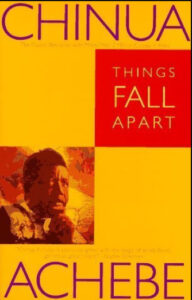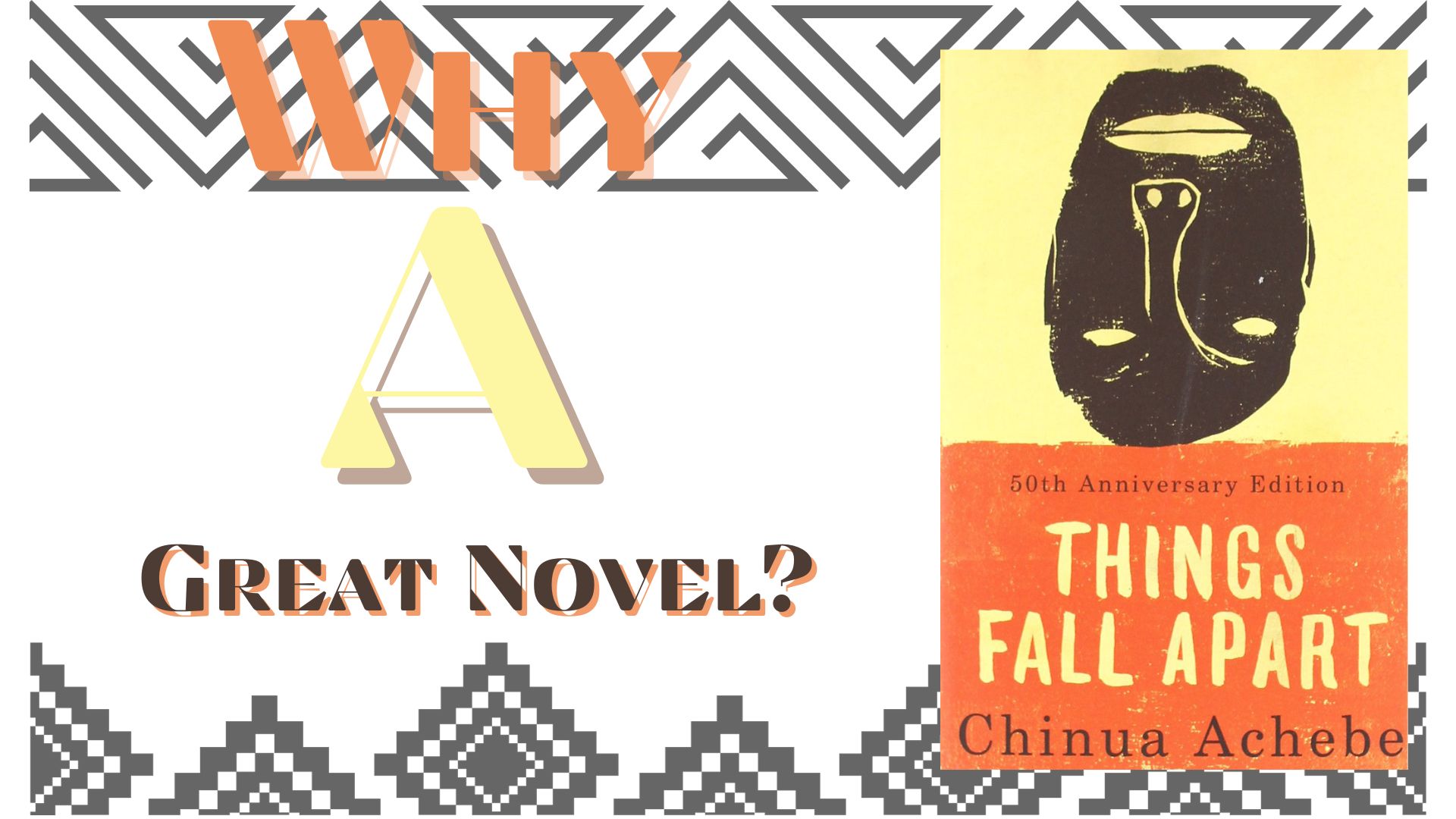Things Fall Apart By Chinua Achebe Is Great Novel, is a narrative that unfolds the existence and customs of the Igbo community in southeastern Nigeria before and during the late 19th-century colonial intrusion.
The tale is centered around Okonkwo, a revered warrior and chieftain of the Umuofia tribe, who is banished for unintentionally causing the death of a fellow tribesman. During his seven-year exile in his maternal village, Mbanta, he becomes a spectator to the advent and proliferation of white missionaries and the colonial administration in the area.
Upon his return to Umuofia, he aspires to reinstate his tribe’s traditions and honor but ends up in a brutal confrontation with the Europeans. The book is recognized as a masterpiece of contemporary African literature and a critique of colonialism.

Character List Of Things Fall Apart By Chinua Achebe
These are the main characters in “Things Fall Apart” by Chinua Achebe:
- Okonkwo: The story’s central character, Okonkwo, is a strong and ambitious Igbo man battling his fear of failure and aggressive nature. He is a respected warrior and leader of the Umuofia clan, exiled for accidentally killing a clansman.
- Unoka: Okonkwo’s father, Unoka, is a gentle and lazy man whom Okonkwo despises for his lack of success and courage.
- Nwoye: Okonkwo’s eldest son, Nwoye, is sensitive and eventually converts to Christianity. Ikemefuna influences him and exhibits more masculine behavior, which pleases Okonkwo.
- Obierika: Okonkwo’s best friend, Obierika, is wise and rational and questions some Igbo traditions and customs.
- Ikemefuna: A young boy who is given to Okonkwo’s family as a peace offering, Ikemefuna becomes like a son to Okonkwo until Okonkwo kills him.
- Ezinma: Ekwefi is the only child of Okonkwo’s second wife. As the only surviving child of Ekwefi, Ezinma is the center of her mother’s universe. Ezinma is Okonkwo’s favorite child because she understands him better than his other children. Ezinma reminds him of Ekwefi when she was the village beauty.
- Mr. Brown: The first white missionary, Mr. X, traveled to Umuofia. Brown implements a policy of compromise, understanding, and non-aggression between his followers and the clan.
Reverend James Smith: The new missionary, Reverend Smith, is strict and uncompromising, unlike his predecessor, Mr. Brown. - District Commissioner: Towards the end of the novel, following the incident where Okonkwo takes the life of a white man, the District Commissioner makes his appearance in Umuofia.
Detailed Plot Analysis of The Things Fall Apart
“Things Fall Apart” by Chinua Achebe is a compelling narrative exploring Okonkwo’s life, a respected warrior in the Umuofia clan in Nigeria. The story unfolds Okonkwo’s rise to power, his relationship with his family, and the tragic events that lead to his downfall.
The arrival of white missionaries in his village introduces a new religion and government, leading to a cultural clash. Okonkwo’s struggle to preserve his traditional values in the face of change forms the crux of the plot. The novel profoundly critiques colonialism and its impact on indigenous cultures.
Okonkwo’s Ascent In Things Fall Apart
The narrative commences with Okonkwo’s ascent to a position of power within the Umuofia clan in Nigeria. Known for his strength, hard work, and determination, Okonkwo is a renowned wrestler who despises his father, Unoka, for his lack of success and courage.
Okonkwo’s status within the tribe grows as he becomes one of the most remarkable men in the land, with three wives and a large stock of yams.
Ikemefuna’s Arrival In Things Fall Apart
To settle a dispute with a neighboring village, the tribe demands the sacrifice of a virgin and a 15-year-old boy who goes by the name of Ikemefuna. Ikemefuna ends up living with Okonkwo’s family for three years and becomes very close to Nwoye, Okonkwo’s eldest son. As time passes by, Okonkwo also grows fond of Ikemefuna.
Ikemefuna’s Death In Things Fall Apart
After three years, Ezeudu, the oldest man in the tribe, informs Okonkwo that they have decided to kill Ikemefuna. Despite Ezeudu’s advice not to participate in the killing, Okonkwo kills Ikemefuna, fearing that others will find him weak.
Okonkwo’s Banishment In Things Fall Apart
During Ezeudu’s funeral, Okonkwo’s gun explodes, killing Ezeudu’s 16-year-old son. As a result, Okonkwo is exiled from the clan for seven years.
Okonkwo’s Life in Banishment In Things Fall Apart
Okonkwo and his family work hard to start a new farm in Mbanta during exile. Okonkwo is highly discouraged by the circumstances and schedules for the day he can return to his rightful place in Umuofia.
The White Men’s Arrival In Things Fall Apart
While Okonkwo is in Mbanta, white men appear among neighboring clans. When they finally arrive in Mbanta, the family finds their religion ridiculous. On the first day, Nwoye becomes mesmerized by the hymn and joins the Christians.
Okonkwo’s Return to Umuofia In Things Fall Apart
A school and a hospital in the Umuofia were built by Mr. Brown, who was a white missionary. Okonkwo saw many clan members enrolling their children in the school. Mr.Brown had changed the town When Okonkwo finally returned to Umuofia.
Clash with the White Men In Things Fall Apart
During a ceremony, Enoch, a zealous convert, tears off the mask of one of the clan’s masked egwugwu, which angers the family. In retaliation, they burn down the church. Reverend Smith reports this incident, and in response, the District Commissioner deceives the clan’s leaders into meeting with him before arresting them.
Themes Of The Things Fall Apart
“Things Fall Apart” by Chinua Achebe delves into several themes that offer a profound understanding of African culture and the repercussions of colonialism. Here’s an analysis of the main themes:
Tradition VS New Changes In Things Fall Apart
The novel explores the tension between the traditional Igbo culture and the new influences brought by the Europeans. The villagers are torn between resisting and embracing change and grapple with determining the best way to adapt to the changing times.
Gender Roles In A Male-Dominated Society In Things Fall Apart
The novel depicts the roles and expectations of men and women in Igbo society and the challenges they face. Much of Okonkwo’s violent and ambitious behavior can be attributed to his troubled relationship with his late father. He strives to rise above his father’s legacy of a spendthrift, sluggish behavior, which he views as weak and, therefore, effeminate.
Power Dynamics In Things Fall Apart
The novel portrays the struggle for social status and political control among the Igbo people and between them and the colonizers. Okonkwo resists the new political and religious orders because he believes they are unmanly, and joining them would make him less of a man.
The Face Of Fear and Aggression In things Fall Apart
The novel illustrates how fear of failure and change drives Okonkwo to act violently and rashly, leading to his downfall. As a result of these fears, he often resorts to violence against his wives, even going so far as to threaten their lives on occasion.
The Richness of Igbo Culture In Things Fall Apart
The novel reveals the richness and diversity of the Igbo culture, its customs, beliefs, and values. The book’s pacing, although irregular, deliberately adheres to an African literary style.
Humanizing African Societies In Things Fall Apart
Chinua Achebe wrote ‘Things Fall Apart’ to retell the story of Africans who had been unfairly portrayed by European imperialists and their enablers in the arts.
The Matter Of Cultural Collision In Things Fall Apart
‘Things Fall Apart’ depicts the tragic displacement of traditional African societies by encroaching Westerners with imperialist ambitions. The community of Umuofia had ruled itself, observed its customs, and preserved its institutions for years.
Why Things Fall Apart By Chinua Achebe Is Great Novel: Explained
For many reasons, the novel “Things Fall Apart” by Chinua Achebe is widely recognized as a remarkable piece of literature. Its profound narrative, exploration of complex themes, unique writing style, and the depth of its characters all contribute to its greatness.
Furthermore, the novel’s significant impact on both African and global literature, coupled with its historical relevance in providing a unique perspective on the effects of colonial rule on traditional African life, further underscores its standing as a timeless literary masterpiece.
- Narrative and Themes: The novel narrates the disintegration of an African tribe, its customs, and values. It presents a conflict of cultures between the Ibo society of Umuofia, a group of nine villages in Nigeria, and the European colonizers and Christianity. It delves into themes such as tradition vs. change, destiny vs. free will, masculinity, and religion.
- Literary Style: The book is crafted with remarkable brevity and subtle irony. Achebe’s style is heavily influenced by the Igbo oral tradition, blending straightforward narration with elements of folk tales, proverbs, and speeches.
- Character Development: The main character, Okonkwo, is a formidable warrior who embodies traditional African culture. His personality and struggles offer a deep insight into the effects of cultural conflict.
- Influence and Impact: The novel has reshaped African and global literature, with over ten million copies sold in forty-five languages. It is considered one of the finest literature to emerge from Africa.
- Historical Relevance: The novel extends a unique perspective on the impact of colonial rule and Westernization on traditional African life.
The novel’s insightful narrative, rich subtext, and exploration of universal human traits make it an enduring piece of literature.
Impact Of Things Fall Apart By Chinua Achebe On History And Society
“Things Fall Apart” by Chinua Achebe has made a profound impact on history and society in numerous ways:
- Revolutionizing African Literature: The novel is considered a pioneering work of modern African literature in English and one of the first to gain international critical acclaim. It played an important role in sparking the Nigerian literary renaissance of the 1960s.
- Postcolonial Discourse: The novel sparked postcolonial discourse on complex relations between the West and former European colonies.
- Challenging Misconceptions: Achebe wrote the book to challenge and correct the negative and unflattering portrayal of pre-colonial Africa in contemporary literature.
- Preserving Culture: Achebe vividly depicts the cultural roots of the Igbos to instill self-confidence.
- Promoting Universal Principles: Achebe also refers to the Igbos as universal principles which vitiate their destructive potential.
- Documenting History: The novel portrays a detailed account of the early colonial penetration in Africa.
- Dispelling Stereotypes: Achebe’s novel breaks down the stereotypical European depictions of native Africans.
- Influencing Culture: The authenticity and thematic
Significance Of The Title Things Fall Apart
The title “Things Fall Apart” holds profound significance as it encapsulates the novel’s core theme, equilibrium and order. The title is borrowed from a line in W. B. Yeats’s poem “The Second Coming,” which depicts a world disintegrating due to chaos and violence. The novel illustrates how the Igbo society and culture lose balance and harmony when faced with colonialism and Christianity.
Furthermore, the title is self-explanatory and summarizes the entire novel. It signifies the fragmentation of the Igbo society that was once free from doubts and had strong beliefs in its customs and values. The title also refers to the protagonist, Okonkwo, who was closely linked to his values and truly adored them.
With his death, all the things that once had much significance fall apart, indicating that the items believed to be unending can end suddenly.
Thus, the title aptly encapsulates the story and the cultural, societal, and personal transformations that occur within it.

